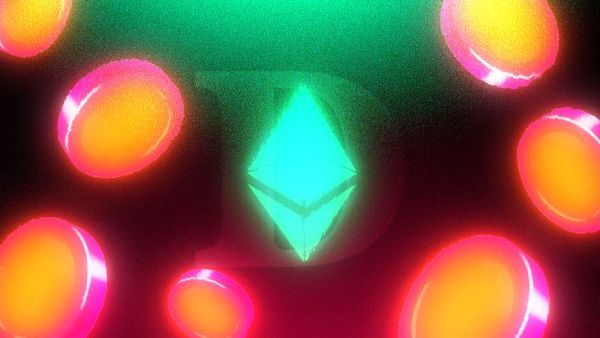Infrastructure and consumer subsector tokens are also underperforming, according to Arch indexes.
Traders have been better off holding ETH than DeFi tokens in the bear market.
While ETH has bled 60% its all-time high of $4,787 in November 2021, at the height of the last crypto bull run, DeFi tokens have well outpaced those losses, according to data from Arch Finance, a provider of crypto indexes.
Arch’s Finance Index, whose components are weighted by market capitalization, is down nearly 85% in the 19 months since that time. Other indexes for infrastructure and consumer subsectors are also down by a similar rate.

ETH Bounce
Further, ETH has bounced back nearly 60% this year, while at a nearly 30% jump, the finance index has relatively underperformed.
With ETH outperforming tokens of decentralized applications built on top of the network, investors who want exposure to the Ethereum ecosystem may think twice before buying these protocol tokens, and might just stick with ETH.
DeFi Tokenomics
Given what some see as DeFi’s promise as a key component of the future financial system, the tokens’ price action suggests that investors aren’t ready to buy the narrative. Or at least, they’re not ready to buy DeFi tokens.
Gordon Grant, co-head of trading at Genesis Trading, a trading desk which is responsible for over $100B in spot volume, emphasized that DeFi tokens don’t necessarily have a clear link with the protocols they’re associated with.
“The real question is, why don’t anyone ever want to own those in the first place,” Grant told The Defiant in an interview. “They don’t really represent something in many cases.”
Value Capture
While DeFi tokens may have valuable brand recognition, they don’t actually represent equity in their associated protocol and often don’t offer any ways to capture value outside of selling them.
A report from the data provider Glassnode which explored the underperformance of DeFi assets highlighted a similar issue. “Few tokens have achieved the so-called ‘fee-switch,’ where cash flows, or dividends are paid to stakeholders,” it noted.

In contrast, ETH also offers yield thanks to Ethereum’s shift to a Proof-of-Stake system. The annual yield of 3.8% available for staked ETH provides further utility for the digital asset which DeFi tokens lack.
Inflationary Rewards
Chris Storaker, CEO of Arch Finance told The Defiant that DeFi projects have struggled with governance issues as well. He noted SushiSwap and MakerDAO, both some of the most recognizable DeFi projects, have both encountered roadblocks as the projects try to move forward as a decentralized autonomous organization (DAO).
Storaker further noted that many DeFi projects used their tokens as inflationary rewards, a sensation in DeFi which attracted users to deposit assets in a given project. Users would often simply sell the rewards as they came in, further driving down the prices of DeFi projects’ tokens.
To be sure, DeFi projects aren’t standing still. For example, there is ongoing work to develop a model which allows holders of the token of Uniswap, DeFi’s largest decentralized exchange (DEX) by volume, to generate yield with their UNI.
Bottom Pickers
Genesis’ Grant emphasized that while the relative downtrend of DeFi tokens is notable, their ascension was exceptional. “We have to remember what those highs were,” he told The Defiant in an interview. “They were one of the greatest peak euphoric moments in markets anytime, anywhere, ever.”
Grant added that Genesis had seen some “bottom pickers” for DeFi tokens, people who thought it was a good time to sweep up the digital assets for cheap. “I think for the most part those kinds of bottom picking trades haven’t bore fruit,” he said.
Read More: thedefiant.io









 Bitcoin
Bitcoin  Ethereum
Ethereum  Tether
Tether  XRP
XRP  Solana
Solana  USDC
USDC  Dogecoin
Dogecoin  TRON
TRON  Cardano
Cardano  Lido Staked Ether
Lido Staked Ether  Wrapped Bitcoin
Wrapped Bitcoin  Hyperliquid
Hyperliquid  Sui
Sui  Wrapped stETH
Wrapped stETH  Chainlink
Chainlink  Avalanche
Avalanche  Stellar
Stellar  LEO Token
LEO Token  Bitcoin Cash
Bitcoin Cash  Toncoin
Toncoin  Shiba Inu
Shiba Inu  Hedera
Hedera  USDS
USDS  Litecoin
Litecoin  WETH
WETH  Wrapped eETH
Wrapped eETH  Polkadot
Polkadot  Monero
Monero  Binance Bridged USDT (BNB Smart Chain)
Binance Bridged USDT (BNB Smart Chain)  Ethena USDe
Ethena USDe  Bitget Token
Bitget Token  Pepe
Pepe  Coinbase Wrapped BTC
Coinbase Wrapped BTC  Pi Network
Pi Network  WhiteBIT Coin
WhiteBIT Coin  Aave
Aave  Uniswap
Uniswap  Dai
Dai  Ethena Staked USDe
Ethena Staked USDe  Bittensor
Bittensor  OKB
OKB  Aptos
Aptos  Internet Computer
Internet Computer  NEAR Protocol
NEAR Protocol  Cronos
Cronos  BlackRock USD Institutional Digital Liquidity Fund
BlackRock USD Institutional Digital Liquidity Fund  Jito Staked SOL
Jito Staked SOL  Ondo
Ondo  Ethereum Classic
Ethereum Classic